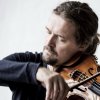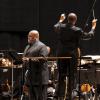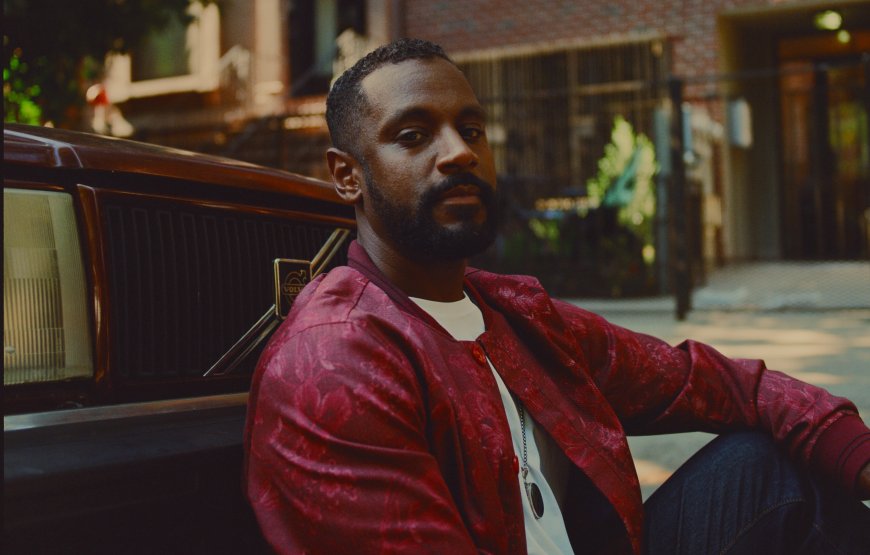
Carlos Simon has been upending cliches for his entire career. During a recent interview with SF Classical Voice, he mentioned one that he finds particularly erroneous.
“I hear people say [about themselves], ‘Music is the only thing I could do,’” said the Grammy Award-nominated composer. “I can think of a lot of things I could do! There are so many elements to being a composer, skills you have to draw on, and they overlap with many careers.
“It’s not just about writing music. It’s also being a diplomat — the ability to work with people, being a good collaborator. There’s also the business element — how to manage different streams of income. There’s speaking. There’s teaching. I could go in any of those directions.
“But music,” he added, “is the best choice for me.”
A native and resident of Washington, D.C., Simon is currently in Los Angeles to oversee the world premiere of his gospel-tinged Good News Mass, which Gustavo Dudamel and the Los Angeles Philharmonic will perform April 17 and 18 at Walt Disney Concert Hall.
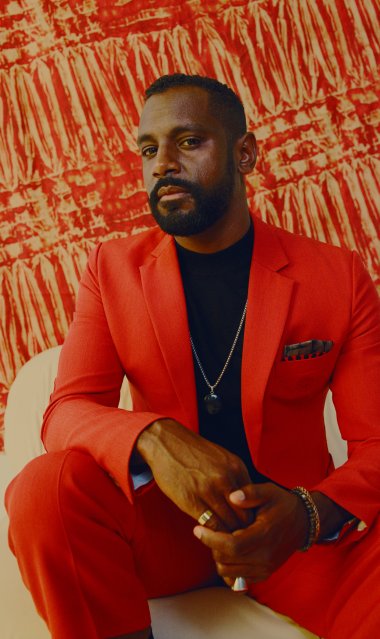
The morning after the first rehearsal, Simon — still excited about the quality of the music-making he had heard the night before — took time to talk about the work and his approach to composing. This conversation has been slightly condensed and edited.
Let’s begin by talking about the genesis of Good News Mass. From your biography, it seems almost inevitable that you would write such a piece given your early immersion in gospel music and your love for the genre. How did the work come about?
In 2021, the [LA Phil] reached out and said, “We’d love you to write a piece for us.” The only stipulation I got was it should be a 30-minute work. I thought it was an incredible opportunity — a great orchestra, a great conductor. I didn’t want to crack under pressure.
When I thought about it, I realized I needed to go back to my roots. I didn’t want to try to impress people. Every time I’ve done that, the piece has flopped. I wanted to be true to who I am.
Growing up in church has shaped my life. My parents, grandparents, and great-grandparents were all ministers. I wanted to join that lineage and use music to make an impact. That’s why the piece is called Good News Mass. I want to spread some good news.
In the score, do you interweave gospel sounds into classical structures? Is that a good description?
Yes, it’s gospel-influenced. I wanted to write music that could be played in any church in America. So I didn’t want to make it too difficult. The songs I’ve written are accessible, at least to the performers. I want people to feel like they are in church, that they feel love in the room. My notion is that God is love, and love shows up in so many different ways.
Were you immersed in gospel music during your childhood?
Oh yes, that’s all we played in the house. No rap or hip-hop. We could throw a little jazz in there.
I read you were also inspired in part by Leonard Bernstein’s Mass. In what ways?
Musically speaking, [Bernstein] draws upon so many different styles. That gave me a launching point. There are so many styles [even] within the genre of gospel music, from traditional to contemporary. I tap into that. I also borrow his idea of using a celebrant [as a sort of narrator].

Bernstein and his librettist, Stephen Schwartz, used the text of the Latin Mass but also wrote new texts they inserted between the standard parts. Are you doing something similar?
Absolutely. I’m using an English translation of the Latin text. Rather than “Kyrie eleison,” I use “Lord have mercy.” That then leads into a song about pain and struggle and human suffering.
The Lord’s Prayer usually comes at the end. But in my dad’s gospel services, we always start with a prayer. So it makes sense for me to start the piece with the Lord’s Prayer. [Spoken-word artist] Marc Bamuthi Joseph wrote [and will perform] new poetry, which kind of marks each section. After he speaks, the soloists or choir will sing two or three songs that are related to the concept at hand.
You mentioned your collaborator Joseph, who also wrote and performed the narration for brea(d)th, your recent choral composition in memory of George Floyd. How does your collaboration work?
There’s a lot of back-and-forth. Sometimes he will send me a recording of him speaking the text, and I’ll write music around that.
But with [Good News Mass], I wrote the music, and then he responded to it. I gave him the note that, throughout the work, he is the preacher giving the sermon.
Melina Matsoukas is creating the visuals. She is incredible and has been really great to work with. Usually with a film, music comes last in the process. But here, I wrote the music and gave it to her, and she basically shaped a film around it.
Although you were born in Washington, D.C., you also grew up in Atlanta, Georgia, where your father’s church is located, and your first hands-on experience with gospel music took place in that church — is that right?
Absolutely. I played the organ beginning at age 10. I would write songs for the choir here and there. It was basically learning by ear.
How and when did you decide to pursue music professionally?
I always knew I wanted to make music — that it was a way for me to feel fulfilled. But I got caught up in the myth that artists are starving. In fact, there are so many different ways to make a living in music. I had to discover that.
At what point did you start focusing on composing?
I was studying piano at Morehouse College. I went into the [music] program thinking I’d be a concert pianist, but I hated practicing. I did all the things I needed to do, but I wasn’t happy. At some point, I started to improvise stuff. I was taking music theory. My teacher noticed I was doing exceptionally well in part-writing and suggested I try composition.
My first piece was for choir. I fell in love with the process — writing the music and then gathering the performers to rehearse and perform it. I’m not a social person at all, but [the process] forced me to be more social, more diplomatic. To see the fruits of your labor performed, to see people enjoying it — it was like a drug.
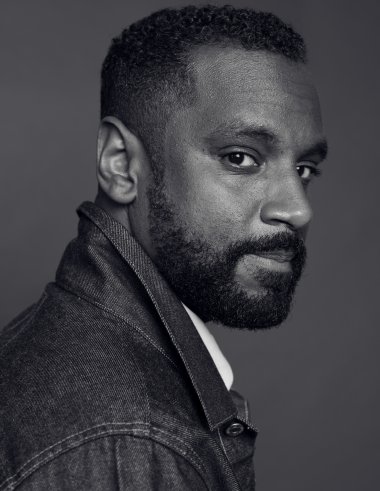
To what do you attribute your success as a composer?
To me, a lot of it is about tapping into my heritage. Once I started doing that — once I was honest about it through the music — things started lining up for me. If you can really be yourself, people connect with that. They can always tell when you’re not authentic.
By your heritage, do you mean the history of Black America?
Yes, but also my heritage as the son of a preacher, being a community servant.
How do you write a politically themed piece without becoming preachy?
I take my playbook from other creators. Listen to Marvin Gaye’s “What’s Going On” — does that sound preachy to you? It feels good, but if you really listen to it intently, it helps you understand the world. It brings awareness. The music is helping you digest the message. With brea(d)th, the music helped people get the message into their bodies and souls on a deeper level.
Speaking of politics, in January 2024 you extended your contract as composer-in-residence at The Kennedy Center in Washington, D.C. Since that announcement, the board and management have been overhauled by the Trump administration, and there is clearly a widespread hostility to the sort of identity-based works that you have often created. Do you feel you will continue to have artistic freedom in the position moving forward? What happens if you do not?
I’m not concerned about that right now. I’ve always said music should reflect what’s happening in the world, and I will continue to do that. Up to this point, I haven’t [experienced] any [top-down] oversight in terms of the music I choose to write. In fact, I’ve had a lot of support. But you’re right — things are different now. I can only speak for myself and what I’m planning to do, which is reflect the times that we live in through music.
I often think about what [Dmitri] Shostakovich had to go through. Or even my ancestors like William Grant Still or Margaret Bonds. She wrote a piece about the Montgomery bus boycott while it was happening. There were many detractors, but that didn’t stop her from writing the piece. I have to draw on that strength and courage.


